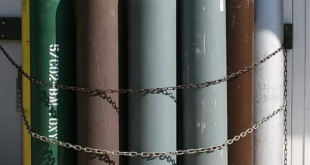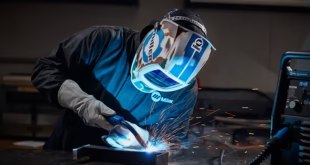How to Become a Professional Welder?
Introduction
Definition of welding
Welding is the process of joining materials, typically metals or thermoplastics, together using heat and pressure. It is a critical component of many industries, including construction, manufacturing, and automotive.
Importance of welding in various industries
Welding is essential for creating strong and durable structures and products. It is used to build everything from bridges and buildings to airplanes and ships. C. Overview of becoming a professional welder: Becoming a professional welder requires a combination of education, training, and experience. In this guide, we will explore the steps you can take to become a skilled welder and build a successful career in this field.

Research and Understand the Welding Industry
Types of welding
There are several types of welding techniques, including MIG, TIG, stick, and flux-cored welding. Each has its own advantages and disadvantages, depending on the materials being welded and the desired outcome.
Welding materials and techniques
Welding can be used on a wide variety of materials, including steel, aluminium, copper, and titanium. Different techniques and materials require different approaches and tools.
Job opportunities and salary potential
Welders are in high demand across many industries, including construction, manufacturing, and shipbuilding. Salaries can vary depending on location, experience, and industry, but the median annual wage for welders in the United States is around $44,000.
Certifications and licensing requirements
Many employers require welders to have certain certifications, such as those offered by the American Welding Society (AWS) or the National Center for Construction Education and Research (NCCER). Additionally, some states have licensing requirements for welders, so it’s important to research these requirements in your area.
Get the Right Education and Training
High school diploma or equivalent
While a high school diploma or equivalent is not always required to become a welder, it can be beneficial to have a basic understanding of math, science, and technical drawing.
Welding certification programs
Many technical schools and community colleges offer welding certification programs that can provide the knowledge and hands-on training needed to become a skilled welder. These programs typically last several months to a year and cover topics such as safety, welding techniques, and metallurgy.
Associate degree programs
Some colleges offer associate degree programs in welding technology that provide a more comprehensive education and can lead to higher-paying jobs or advancement opportunities.
Apprenticeships and on-the-job training
Apprenticeships and on-the-job training allow aspiring welders to learn from experienced professionals while earning a wage. These programs can vary in length and may include classroom instruction as well as hands-on training.
Ongoing training and professional development
Welding technology is constantly evolving, so it’s important for welders to stay up-to-date on the latest techniques and technologies through ongoing training and professional development. This can include attending workshops and seminars, obtaining additional certifications, or pursuing a higher degree.
Develop the Necessary Skills and Experience
Attention to detail and manual dexterity
Welding requires a high level of precision and attention to detail, as well as strong hand-eye coordination and manual dexterity. Practicing with welding equipment and tools can help develop these skills.
Physical fitness and stamina
Welding can be physically demanding, requiring standing or kneeling for long periods of time, lifting heavy materials, and working in awkward positions. Maintaining good physical fitness and stamina can help reduce the risk of injury and improve overall performance.
Problem-solving and critical thinking
Welding often involves troubleshooting and problem-solving when unexpected issues arise. Developing strong problem-solving and critical thinking skills can help welders find solutions to complex issues.
Communication and teamwork
Welding projects often involve collaboration with other professionals, such as engineers, designers, and contractors. Good communication skills and the ability to work well in a team can help ensure projects are completed on time and to the desired specifications.
Build a Professional Network
Attend welding trade shows and conferences
Welding trade shows and conferences are a great way to meet other professionals in the field, learn about new technologies and techniques, and stay up-to-date on industry trends
Join professional organizations and associations
There are several professional organizations and associations for welders, such as the American Welding Society (AWS) and the International Association of Welding (IAW). These organizations provide networking opportunities, access to resources and information, and certifications and training programs.
Connect with other welders and industry professionals
Networking with other welders and industry professionals can provide valuable insights and opportunities for career advancement. This can be done through social media platforms, online forums, and local welding groups or clubs.
Find Employment and Advance Your Career
Job search strategies and resources
Job search strategies for welders can include networking, online job boards, job fairs, and contacting companies directly. It is also important to research potential employers and prepare a strong resume and cover letter.
Tips for successful job interviews
Preparing for job interviews involves researching the company and the job, practicing common interview questions, and presenting a professional image. During the interview, it is important to showcase relevant skills and experience and demonstrate a strong work ethic and a willingness to learn.
Continuing education and advanced certifications
Continuing education and advanced certifications can lead to higher-paying jobs and advancement opportunities. Welders can pursue certifications in specialized welding techniques or obtain additional education in engineering or project management.
Management and leadership opportunities
Experienced welders may have opportunities to move into management or leadership positions, such as welding supervisor or project manager. These positions require strong leadership and communication skills, as well as technical knowledge of welding processes and equipment.
FAQs
How long does it take to become a good welder?
Becoming a good welder takes time, practice, and experience. Some individuals may become proficient in a few months, while others may take several years of training and experience to become skilled welder.
What is the highest qualification of a welder?
There are several advanced certifications available for welders, including the Certified Welding Inspector (CWI) and the Certified Welding Educator (CWE) certifications offered by the American Welding Society (AWS). These certifications require extensive training and experience, as well as passing a rigorous exam.
What is the highest welding salary?
The highest welding salary varies depending on factors such as experience, location, and industry. However, welders who have advanced certifications and experience in specialized welding techniques such as pipeline welding or underwater welding can earn salaries upwards of $100,000 per year.
What qualifications do I need to be a welder?
To become a welder, a high school diploma or equivalent is typically required. Welders can also obtain certification through welding programs offered at technical schools or community colleges, and may pursue advanced certifications through organizations such as the American Welding Society.
Is welding a successful career?
Yes, welding can be a successful career. Welding is a skilled trade that is in high demand in industries such as construction, manufacturing, and transportation. Welders can earn competitive salaries, and there are opportunities for career growth and advancement with additional education and certifications.
What is 6G welding position?
6G welding position refers to a welding position where the pipe or plate is inclined at a 45-degree angle and the pipe is rotated during welding. This position is considered to be one of the most difficult welding positions and requires advanced skill and training.
Is welding a hard skill?
Yes, welding is considered a hard skill because it requires specific technical knowledge and manual dexterity to perform the task effectively. However, with practice and training, individuals can develop the necessary skills to become proficient welders.
Which welder is easy to learn?
MIG welding is considered to be one of the easier welding techniques to learn because it involves a simple operation and requires less manual dexterity than other welding techniques.
Is welding a stressful career?
Welding can be a stressful career, as it involves working in hazardous conditions and can be physically demanding. However, with proper training and safety measures in place, many welders find the work to be rewarding and satisfying.
Conclusion
Becoming a professional welder involves understanding the industry, obtaining the necessary education and training, developing the necessary skills and experience, building a professional network, and advancing your career through ongoing education and certifications. Welding is a rewarding and fulfilling career that offers opportunities for growth and advancement. The welding industry is in demand and offers a variety of job opportunities with competitive salaries. To succeed as a professional welder, it is important to stay current on new technologies and techniques, continuously improve your skills, and maintain a strong work ethic. With dedication and hard work, a career in welding can be both financially and personally rewarding.
 Welding of Welders All about Welding and Welders
Welding of Welders All about Welding and Welders



